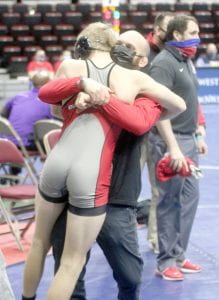It’s been a week. My emotions have been all over the place, as we celebrated Owen’s trip to the IHSAA Wrestling Tournament, where he earned a place on the podium. His 8th place finish was not where he wanted to land, but we couldn’t be more proud! The weekend was filled with celebrations and frustrations, all part of the process.

Photo courtesy of Luke Rickelman

Photo courtesy of Pen City Current

Photo courtesy of PCC

Photo courtesy of Becky Kobelt

Photo courtesy of Becky Kobelt
In addition, we celebrated Elton’s (our oldest) 20th birthday on Tuesday, and are celebrating Emmett’s (our youngest) 16th birthday today!

The Kruse Boys: Elton, 20; Owen, 17; Emmett, 16
Along with these celebrations, I’ve experienced several frustrations in my coaching role this week. They sure seemed to stack up, one after another. After engaging in lots of self-reflection, as well as conversations with loved ones (thank you Bill, Elton, Owen, Emmett, Mom, Dad, Isaac, and Aaron), friends (thank you Clint), and colleagues (thank you coaching team), I’ve settled on today’s post, centered around my coaching beliefs… which also happen to overlap with my “how to live your best life” beliefs:
- Relationships first
- Students are at the center of our work
- Coaches and teachers are colleagues
- Listen to understand, not to be understood
- Solutions oriented and forward thinking
- Failure is a critical part of the process
- Bad moments, not bad days
- Always seeks opportunities to grow
Although this is the first time I’ve formalized my coaching (life) beliefs in writing (thank you Leanna S. Harris and Diane Sweeney for the inspiration to do so!), I sure do hold them dear to my heart.
Relationships first
I had a terrific conversation with my nephew, Isaac, this week. One of the first things he asked when we sat down together was, “Megan, what do you value the most?” My response: relationships. At the end of the day, it doesn’t matter what we have accomplished if we haven’t connected with others in a positive way. Humans thrive on connection: if 2020 has taught us nothing else, it is this. As a teacher, I will not see the student achievement that is the end goal if I haven’t first established solid relationships with my students. When I was in the classroom, the relationships I established with my students and their families remain what I consider one of my biggest accomplishments. Getting to know students was one of my favorite parts of the job.
In the coaching world, relationships with teachers are important, and I enjoy establishing them as much as I did with my students. The caveat here, as Diane Sweeney and Leanna S. Harris remind us in Student-Centered Coaching: The Moves is that “Relationships are an important factor, but not our goal.” In other words, when coaching alongside teachers, we want to nurture the relationship with them, but our end goal is student achievement.
Students are at the center of our work
When we engage in coaching cycles with teachers, student learning remains at the forefront of all that we do. As Sweeney and Harris explain in The Essential Guide for Student-Centered Coaching: What Every K-12 Coach and School Leader Needs to Know, “Our students don’t go to school to participate in programs, they don’t go to school to behave, and they don’t go to school to score well on tests. They go to school to learn, so it only makes sense that this should be the focus of our coaching. If our ultimate goal is to increase student achievement, then coaching should be designed to do just that.”
Coaches and teachers are colleagues
When coaches and teachers come together to engage in a coaching cycle, their end goal is increased student learning. Both coach and teacher come to the table with a set of skills; their work is done side by side, with neither being the expert. The coach is not there to “fix” the teacher, but rather roll up his/her sleeves and do the work with the teacher. The coach’s role includes, but is not limited to: asking questions that focus the work on student learning; structuring the work with a backward design format; identifying learning targets connected to standards; helping the teacher collect baseline, formative, and summative data; modeling effective instructional practices; and co-teaching. From The Essential Guide for Student-Centered Coaching: What Every K-12 Coach and School Leader Needs to Know, “Yet when coaching focuses solely on improving instruction {rather than a focus on improving student learning} the focus is on implementing a certain practice, strategy, or structure. When this is the case it’s easy to lose sight of the real goal, which is student learning.”
Listen to understand, not be understood
In Stephen Covey’s book, The 7 Habits of Highly Effective People, he reminds us with Habit # 5: “Seek First to understand, then to be understood .” In other words, shut up and listen. When we come to a conversation with our own agenda, we miss the opportunity to understand other perspectives. We may be so convinced that what we have to say is “right” that we limit what we hear from others because we are so hyper-focused on what we are going to say when it’s “our turn” to talk. George Couros expands on this idea beautifully in this Listening to Move Forward blogpost and podcast episode. This critical life skill certainly applies to the work of an instructional coach in coaching cycles.

Solutions-oriented and forward thinking
In the Fort Madison Community School District, we operate as professional learning communities (PLC’s), under the framework outlined by Solution Tree. In Solution Tree’s book Learning by Doing, authors DuFour, DuFour, Eaker, Many, and Mattos describe the process of establishing team norms, “ground rules or habits that govern the group.” Many of our FMCSD teams have landed on a norm (not so much a rule as a “collective commitment”) that says something along the lines of “Be solutions-oriented and forward thinking.” In other words, when we come to the table with a problem, we are obligated to bring solutions as well. If we are not recognizing any solutions, we trust that our team will assist in finding solutions, which reinforces a forward-thinking mindset. It’s easy to fall into the trap of identifying problems without solutions, which quickly spirals into a bitch-fest with an outcome of zero forward momentum around student achievement. We become focused on those things that we cannot control, rather than focusing on those things that are within our control. We might temporarily feel better, having gotten something off our chest, but in turn we have lost sight of our ultimate purpose. The beauty of the PLC process is that every member of the team (not just administrators, instructional coaches, or team leaders) has accountability in returning the team to their agreed-upon norms, resulting in a focus on student achievement and forward thinking.
Failure is a critical part of the process
Allowing and perhaps even encouraging failure is (or should be) a basic premise in classrooms. A.J. Juliani illustrates the idea in his “My 2020 Failing Report” blog post (he produces an annual failing report!) Juliani shares this quote: “I know there are many different definitions of failing, but as a class, we adopted a mantra: Sometimes you win, and sometimes you learn.” Failing should be expected, encouraged, and acted upon. I embraced this idea (although not as well as Juliani) when I was in the classroom. I tried to maintain an environment of safety where failure was accepted as part of the learning process. Too often, though, I would jump in and try to “help” a student before the failure occurred. As an instructional coach, I am often guilty of the same thing. Perhaps it’s because the work is with adults, and as adults we forget that we still make mistakes… as we should. We are still learners, too.
Bad moments, not bad days
Speaking of failure, in my perpetual state of self-reflection, I can get caught up in a cycle of never feeling “good enough” as an instructional coach. As I mentioned at the beginning of this post, it’s been a week. There were lots of challenges that came my way early in the week. I reached a boiling point resulting in tears, feeling sorry for myself, and losing sight of being solutions-oriented and looking for some victories along the way. I’ve heralded myself as a positive thinker for several years now (didn’t land there on my own; I was and continue to be encouraged by the work of folks like Will Bowen, Jon Gordon, Eckhart Tolle, Hal Urban, and Dan Harris). This thought came my way via an email from Jon Gordon this week, and was the impetus for changing the “poor-me” mindset that had taken hold of me:

Bad moments, failures, setbacks are a part of everyday life. We want to get in the habit of recognizing bad moments for what they are (learning opportunities), name and sit with with the feelings that come with those bad moments, then MOVE ON. We have to constantly monitor ourselves so that we don’t get stuck in the bad moment and allow it become a bad day, week, month, or year.
Always seek opportunities to grow
As a teacher, a teacher leader, an instructional coach, a professional of any kind, heck… as a human being, we find ourselves seeking opportunities to grow. It’s sometimes easy to forget that the opportunities are there, so we may need to remind ourselves to look for them. In my role as an instructional coach, I am grateful for the multitude of learning opportunities that come my way. As mentioned in previous posts, I’ve benefited from the work of many. Currently, I am grateful for my enrollment in the Foundations for Student-Centered Coaching course, Creating and Delivering Incredible Presentations for Any Space , attendance at OER’s Community Coaches PLC’s for support with implementing the EL Education curriculum, the completion of The Digital Portfolio Master Course, which has allowed this platform to take shape, and the potential to enroll in an Orton-Gillingham course offered by the institute for multi-sensory education. My own growth is an integral part of my job, but I would be guilty of malpractice if I weren’t encouraging and seeking out opportunities for the teachers I work with to do the same. Growing together accelerates the growth for the most important people of all: the students we serve!
Oh, and when we are growing, let’s keep a focus on the “why,” as my niece, Rachel reminds us.

An outside run after months on the treadmill!
Well I think I’m caught up reading all of your blogs now Megan. Each and every one I have thoroughly enjoyed, been completely inspired by, and am full of admiration and pride. I am not however surprised by you. You taking on blogging – holy cow!!! We’re all always talking about time, our most precious commodity. You have chosen to dedicate some of yours to this endeavor. Those of us who take far less of our time to read your messages than what it takes for you to put them together appreciate YOU!!! I thought it’s about time that I leave a comment and since this last blog of yours has shout outs to 2 of my kids- Isaac and Rachel, I had a little more “internal” pressure to do so.
Love you!
Bad moments are my Achilles heel.
This too shall pass….. Easier said after the moment rather than during the moment.